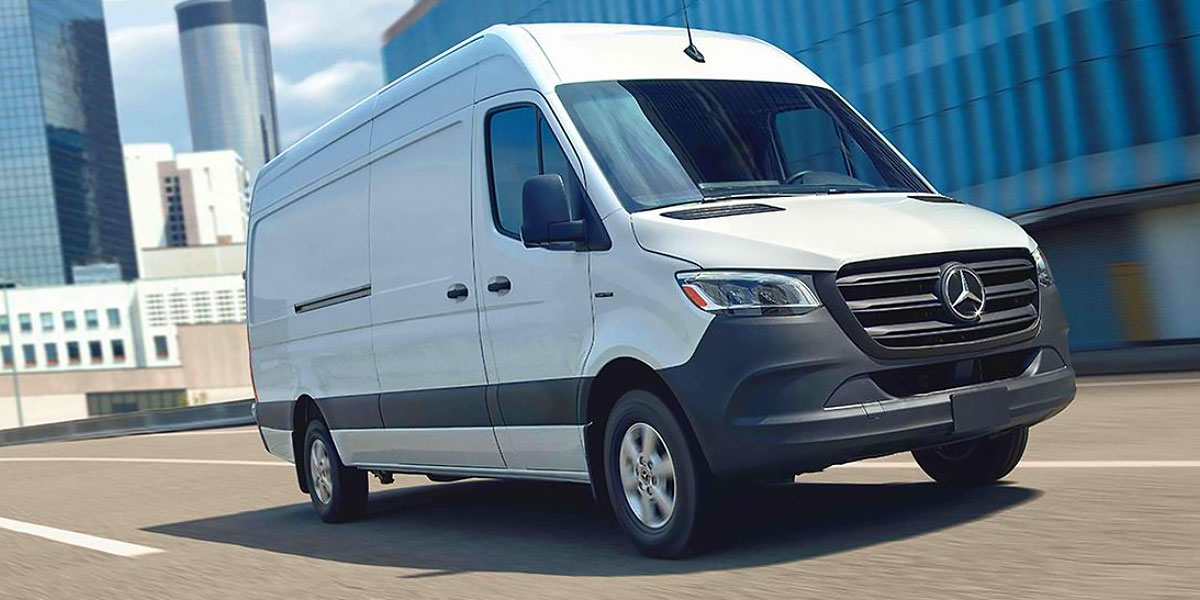Mercedes-Benz eSprinter
The Mercedes-Benz eSprinter is a 2023 electric cargo van with a 113 kWh LFP battery, 331 km (206 mi) range, 201 hp, and 900 kg (1,984 lbs) payload capacity. Built in Germany, it starts at $63,475 (€59,031) and features MBUX infotainment and DC fast charging.
User Rating: 3 / 5 (16 votes)





Base Trim Price: $63475 USD *
| truck type | delivery van |
| manufactured in | Germany |
| model year | 2023 |
| range (km) | 331 |
| speed (km/h) | 120 |
| power (hp) | 201 |
| battery (kWh) | 113 |
| cargo capacity (kg) | 900 |
| drive type | RWD |
* Minimum price set for the base trim by the manufacturer

Exterior and Interior photos of Mercedes-Benz eSprinter
Mercedes-Benz eSprinter Review
eSprinter 2023: Mercedes-Benz Brings Electric Precision to Urban Hauling
Mercedes-Benz has officially electrified one of the most trusted names in fleet hauling—the Sprinter. Enter the eSprinter, a rear-wheel-drive, German-built cargo van launched in 2023 that doesn’t try to be flashy. It just does the job, cleanly and confidently. For urban couriers, tradespeople, or sustainable fleet managers, this is a plug-and-play work van that brings both torque and tech to the tarmac.
- Launched in 2023, the eSprinter is manufactured in Germany with a carbon-neutral footprint and sustainability-focused LFP battery chemistry.
- Priced at $63,475 (€59,031), it slots between economy electric vans and high-end commercial haulers.
- It keeps the classic Sprinter silhouette while offering up to 488 cu ft of cargo space and multiple wheelbase options.
eSprinter Specs: Built for Work, Tuned for Comfort
Battery
The eSprinter’s 113 kWh LFP battery puts up solid numbers—up to 331 kilometers (205.7 miles) on a full charge. DC fast charging at up to 115 kW fills from 10–80% in 42 minutes, while AC charging at 9.6 kW takes 11 hours overnight. Its nickel- and cobalt-free battery also supports longer lifecycle usage with fewer environmental concerns.
- Battery Capacity: 113 kWh (LFP)
- Range: 331 km (206 mi)
- DC Fast Charging: Up to 115 kW (42 mins for 10–80%)
- AC Charging: 11 hours (9.6 kW)
Performance
The eSprinter delivers 201 horsepower (149.9 kW) and 295 lb-ft (400 Nm) of torque to the rear wheels. It’s not built for sprints, but for steady, composed deliveries through dense cities or industrial parks. Top speed sits at 120 km/h (75 mph), and three drive modes—plus one-pedal driving in D++ mode—let drivers tailor power to load and route.
- Power Output: 201 hp (149.9 kW)
- Torque: 295 lb-ft (400 Nm)
- Top Speed: 120 km/h (75 mph)
- Drive Type: Rear-Wheel Drive (RWD)
Wheelbase options (144 and 170 inches) let operators pick between tighter maneuvering or extended cargo space, depending on needs.
Exterior and Interior: Familiar Utility Meets Modern Comfort
Exterior
The eSprinter looks like what it is—a Sprinter. No frills, no futuristic angles. Just solid steel panels, two available wheelbases, and rear doors that open 270 degrees for easy access. Body-on-frame construction and practical side-access layouts make loading a breeze, especially in tight loading docks.
Interior
Inside, it’s business with a touch of Benz. Heated captain’s chairs, a 10.25-inch MBUX touchscreen with voice command, and plenty of stowage. Ergonomic switchgear and drive modes show that Mercedes knows what drivers endure on a shift—and made it less painful.
Pros and Cons of the Mercedes-Benz eSprinter
Pros
- 113 kWh LFP battery with 331 km (206 mi) WLTP range
- Durable and practical cargo space (up to 488 cu ft)
- Refined driving experience with one-pedal mode
- Carbon-neutral production and sustainable battery chemistry
- Premium MBUX infotainment and heated seating standard
Cons
- DC charging limited to 115 kW
- Payload capacity of 900 kg (1,984 lbs) not class-leading
- Heavier trims may face licensing issues in some markets
- No AWD variant or dual-motor configuration
- Not eligible for some U.S. state-specific incentives
Conclusion: eSprinter Brings Logic and Luxury to Electric Logistics
The eSprinter isn’t trying to reinvent commercial hauling—it just executes it better and quieter. With a premium cabin, responsible engineering, and a focus on the real-world needs of delivery professionals, this electric van trades razzle-dazzle for reliability. If you want something German, green, and built to hustle—without alerting the neighbors—the eSprinter’s your ride.
Watch the Video Overview
Full Specifications List:
Model Specs
| Specification | Actual Data |
|---|---|
|
Model
|
Mercedes-Benz eSprinter
|
|
Model Year
|
2024
|
|
Manufacturer
|
Mercedes-Benz Vans
|
|
Manufactured In
|
Germany
|
|
Vehicle Class
|
Electric Commercial Van
|
Performance
| Specification | Actual Data |
|---|---|
|
Power Type
|
Full Electric
|
|
Powertrain
|
Single Motor Electric Drivetrain
|
|
Drive Type
|
FWD or RWD
|
|
Maximum Power Output
|
204 hp - 150 kW
|
|
Maximum Torque
|
400 Nm - 295 lb-ft
|
|
Maximum Speed
|
120 km/h - 75 mph
|
Battery and Charging
| Specification | Actual Data |
|---|---|
|
Battery Type
|
Lithium Iron Phosphate
|
|
Battery Capacity Options
|
56 kWh or 81 kWh or 113 kWh
|
|
Nominal Voltage
|
800 V
|
|
AC Charging Power
|
11 kW
|
|
DC Fast Charging Power
|
115 kW
|
Estimated Range Data
| Specification | Actual Data |
|---|---|
|
WLTP Range Max
|
440 km - 273 miles
|
Body Specifications
| Specification | Actual Data |
|---|---|
|
Length
|
5,932 mm - 233.6 in
|
|
Width
|
2,020 mm - 79.5 in
|
|
Height
|
2,696 mm - 106.1 in
|
|
Gross Vehicle Weight Rating
|
4,250 kg - 9,370 lb
|
Exterior Design Features
| Specification | Actual Data |
|---|---|
|
Body Style
|
High roof panel van
|
|
Sliding Doors
|
Single or dual sliding side doors
|
|
Lighting
|
Full LED exterior lighting
|
Interior Design and Materials
| Specification | Actual Data |
|---|---|
|
Seating Configuration
|
2 or 3 seats
|
|
Upholstery
|
Commercial grade fabric
|
|
Cabin Focus
|
Professional delivery and logistics use
|
Cabin Technical Features
| Specification | Actual Data |
|---|---|
|
Instrument Cluster
|
Digital driver display
|
|
Infotainment
|
MBUX multimedia system
|
|
Connectivity
|
Mercedes-Benz fleet and telematics services
|
|
Driver Assistance
|
Advanced safety and driver assistance systems
|
F.A.Q. about Mercedes-Benz eSprinter
What is the range on a single charge?
The Mercedes-Benz eSprinter offers up to 331 km (206 miles) of WLTP range, depending on configuration and cargo load.
How long does it take to fully charge?
DC fast charging from 10% to 80% takes about 42 minutes, while a full AC charge using a 9.6-kW wallbox takes around 11 hours.
What is a battery capacity?
Battery capacity refers to how much energy the battery holds. The eSprinter features a 113 kWh LFP battery—good for commercial use and long life cycles.
What is the price of a eSprinter?
The Mercedes-Benz eSprinter starts at $63,475 (€59,031), offering a mid-range electric cargo van option with premium features and German build quality.
What is top speed?
The eSprinter has a top speed of 120 km/h (75 mph), suitable for both urban and light highway use.
What is total power?
It produces 201 hp (149.9 kW) and 295 lb-ft (400 Nm) of torque, delivered through a rear-wheel-drive setup.
How much cargo can it carry?
The van handles up to 900 kg (1,984 lbs) of payload and has cargo space between 319–488 cu ft depending on wheelbase length.
Is the eSprinter suitable for long-distance deliveries?
While ideal for urban deliveries, its 331 km (206 mi) range and fast DC charging make it viable for regional hauls as well.
Can it be charged using renewable energy?
Yes, if paired with green electricity sources at your facility or through your provider, the eSprinter can run entirely on renewable energy.
Are there different size options available?
Yes, the eSprinter is available in two wheelbases: 144-inch and 170-inch, allowing flexibility in cargo volume and maneuverability.
Comparison:
Stacking up the Mercedes-Benz eSprinter against class rivals like the Rivian EDV, Ford E-Transit, BrightDrop Zevo 600, and Ram ProMaster EV highlights how well Mercedes balances German engineering with everyday fleet needs.
Range
With a 113 kWh battery, the eSprinter clocks in at 331 km (205.7 miles)—outpacing the Rivian EDV at 240 km (149 miles) and matching the Zevo 600 at 250 km (155 miles). The Ford E-Transit trails with 200 km (124 miles), while the ProMaster EV tops out near 170 miles (274 km). For fleets needing reliable daily range, Mercedes offers solid mileage without overkill.
Acceleration and Top Speed
The eSprinter maxes out at 120 km/h (74.6 mph)—about even with the Rivian EDV and faster than the Zevo 600. The Ford E-Transit has a slight edge in top speed but lacks the smooth torque curve of Mercedes' 201 hp setup. If you’re not racing but want consistent highway merging, the eSprinter fits the bill.
Power and Torque
With 201 hp (149.9 kW), the eSprinter delivers more oomph than the base E-Transit (266 hp) or Zevo 600 (300 hp), though the torque at 295 lb-ft remains competitive. The Rivian EDV leads slightly with 320 hp, but Mercedes’ balance of power and ride refinement makes a lasting impression.
Charging Time
The eSprinter charges from 10–80% in 42 minutes using 115 kW DC fast charging. That’s a bit slower than the Ram ProMaster EV (150 kW) but faster than the Zevo 600 at 120 kW. Ford E-Transit supports up to 115 kW as well, so Mercedes holds its own with typical fleet depot setups.
Price
Starting at $63,475 (€59,031), the eSprinter is more affordable than the Rivian EDV ($86,000), undercuts the Zevo 600 (~$85,000), and falls between the E-Transit ($51,000) and ProMaster EV (~$58,000). Considering the tech and cabin quality, it’s priced right for buyers looking to cut emissions without cutting corners.















